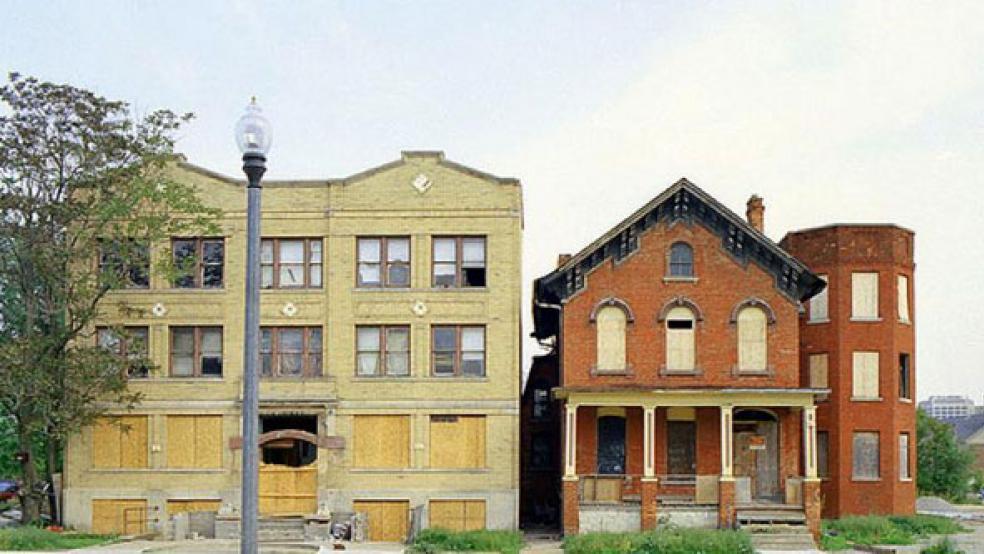For Detroit, the road in and out of U.S. bankrupcy court is paved with casino money.
An economic lifeline, wagering tax revenue from the city's three casinos is at the heart of the bankruptcy plan submitted by Emergency Manager Kevyn Orr, and it is behind the surprise rejection of a deal with banks last week that has thrown a wrench into Detroit's route and timing to recovery.
Related: After Detroit, Who Will Cut City Pensions Next?
Moreover, some $330 million in assistance pledged by a coalition of philanthropic groups, including the Ford Foundation and the Kresge Foundation, will not begin flowing to Detroit until it exits bankruptcy, the head of one group told Reuters.
Michigan voters in 1996 approved casino gambling in Detroit, hoping to revitalize the ghost town. Three glitzy resorts eventually opened, helping to spark a burst of energy and bringing as much as $180 million in annual taxes. But the funds have been tied up since 2009 by a separate, disastrous deal that Detroit is trying to reverse.
In an effort to reduce its unfunded pension liability, the city sold $1.45 billion of bonds in 2005 and 2006, then used derivatives known as swaps to cut risk. The derivatives deal backfired as interest rates dropped, when Detroit expected them to rise. When Detroit's credit rating was cut to junk in 2009, banks had the option to demand $400 million, and the city fended off immediate payment by pledging casino revenue as collateral.
Related: Detroit's 60-Year Decline into Bankruptcy Hell
The deal's continued threat to Detroit's financial future was one of the key elements that pushed the city into the largest municipal bankruptcy in U.S. history in July. Now with an eye to exiting bankruptcy court, the city is seeking unfettered access to the casino funds to help improve city services - and finance a loan to terminate the derivatives deal. "Every day that we don't have access to casino revenue, we cannot make the necessary investment in this city to provide for the health, safety and welfare of the citizens," Orr said in a deposition last August, shortly after bankruptcy was declared.
In late December, he negotiated a deal for the banks behind the derivatives deal to take a 43 percent reduction in value, only to have federal bankruptcy Judge Steven Rhodes last week reject the plan, saying the discount was not deep enough. Orr had hoped to get Detroit out of bankruptcy by September 2014.
"Reports of the quick in and out of Chapter 9 for Detroit may be measurably exaggerated," said William Brandt, president and CEO of Development Specialists Inc, which deals with restructuring and public finance.
'No Way' Without Casino Money
Casino taxes, Detroit's third biggest revenue source after municipal income taxes and state revenue sharing, have been described by Orr and his consultants as the city's most stable source of money. "They've got to get the revenues. There's no way they can make the plan work without those revenues," said Laura Bartell, a Wayne State University law professor.
Related: Multi-Million-Dollar Detroit Art Collection Tainted If Sold
As Orr was preparing to take Detroit into bankruptcy last summer, he first negotiated a deal with the banks behind the swaps, Merrill Lynch Capital Services and UBS AG, that would help emancipate the city from the swaps deal at a 25 percent discount to the nearly $300 million estimated cost at the time. As the bankruptcy proceedings got under way, under pressure from Rhodes, Merrill and UBS agreed to raise the discount to 43 percent, reducing Detroit's payment to $165 million plus up to $4.2 million in costs.
But last week Rhodes declared the concessions still were not enough. He called the payment "too high a price" and put the casino money at the center of debate by declaring that Detroit probably did not have a right to pledge that money as collateral in the first place under state law. He suggested Detroit might win in a bid to invalidate the swaps altogether if a court were to find the city had no right to pledge the casino money.
Pain to Go Around
One message from Rhodes' ruling is that all creditors have to lower their expectations, said Richard Ciccarone, president and CEO of Merritt Research Services, a provider of municipal bond credit information. "(The judge) wants everybody to feel the pain. Nobody is getting special treatment," he said.
James Spiotto, a municipal bankruptcy expert at law firm Chapman and Cutler, said Rhodes rejection of the deal may benefit Detroit in the long term. "It will motivate people that the emergency manager is negotiating with to rethink their positions," he said.
Rhodes' ruling Thursday also introduced new questions about whether Detroit can count on casino money to fix its problems. His comment from the bench that the original pledge of casino money for the swaps deal may have violated Michigan's gaming law raised questions about Detroit's new plan to get out of the derivatives mess: a loan secured with a pledge of the city's income and casino tax revenue. Detroit had planned just such a loan, of $285 million, from Barclays, to pay off the swaps and provide funds for running the city as well.
When he rejected the plan to end the current derivatives deal, Judge Rhodes effectively swept aside that plan. He also emphasized that he would need to approve any new loan involving casino revenue, to make sure they are not misused.




